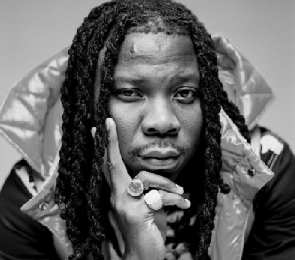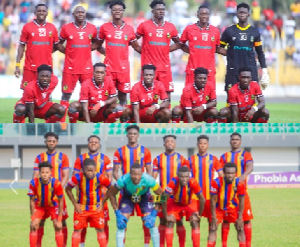Afrobeats may be the dominant sound right now in Ghana, as in many other African countries, but the sounds of Jamaica can still be heard blaring through the speakers of Ghana's roadside and beach bars almost every day. Thursdays are reggae night in two big clubs in the capital, Accra - turning up the heat in an already hot climate.
Jamaican musicians such as the late greats Bob Marley and Peter Tosh and the group Culture have long been credited with planting the seeds of reggae music on African soil 50 years ago - and Ghana shows the roots have grown deep, and gone on to produce homegrown talent.
This love of reggae has also had a cultural bearing on the language: it is not hard these days to hear Ghanaians talking a little Jamaican Patois, which is different from Pidgin English, a lingua franca spoken by roughly a fifth of Ghana's population.
Take Livingston Satekla, one the biggest reggae-dancehall artists to come out of Africa, better known as Stonebwoy. The spelling of his stage name is a nod to Jamaican Patois.
The phrase "Who is that boy singing?" in Ghanaian Pidgin is: "Who be dat boy weh he de sing for deh?" In Jamaican Patois it is: "Ah who dat bwoy weh im ah sing fi deh?"
In a recent interview Stonebwoy and I discussed the growing use of Patois in Ghana, frowned upon by some Ghanaians.
"What's wrong with learning to communicate in Patois, which comes as part and parcel of reggae-dancehall as a core tool of communication? If you love reggae-dancehall you ought to learn Patois," the 34-year-old musician told me.
Born in the ghettos of Ashaiman outside Accra, Stonebwoy would regularly listen to Jamaican dancehall dons like Capelton, Anthony-B and Beenie Man as a teenager - wanting to sound just like his Patois-speaking heroes.
He would later go on to host some of the very same people at his annual BHIM Concert, arguably one of the most successful dancehall showcases in Africa.
It takes place in December as part of Ghana's Beyond The Return campaign - a project designed to encourage people from the diaspora to visit the country.
It draws big crowds - me included - and last year featured Jamaica's Busy Signal, who had many of his fellow countrymen and women singing along to his hits.
Some in the audience could be seen with dreadlocks - worn by Rastafarians.
Reggae has been instrumental in spreading the rasta message. It too has been a cheerleader for Africa - singing about the beauty of the continent, boasting of its natural resources while calling for people in the diaspora to return to the motherland.
This has gone a long way to solidify the bond between reggae and Africa, especially during and after colonial rule.
It makes sense that Ghana, among the first African countries to gain independence (from the UK in 1957), gravitates to the sounds of struggle and strife associated with reggae. It has had plenty of struggle and strife, having experienced six military coups between the 1960s and 1980s.
Classique Vibes – Higher 70's GHANA Roots Reggae #afrosunny #ghana #ghanamusic #ghanaian #ghanaianmusic #ghanareggae #afrobeat #ghanasongs #reggaemusic #ghanahighlife #highlife #highlifemusic #ghanaianreggae #accra #accramusic #kumasi #ghanapeople https://t.co/VAi448Uufj pic.twitter.com/3oHDpStkv7
— afrosunny (@afrosunny1) February 4, 2023
One of the first big reggae artists in Ghana was Kojo Antwi, also known as Mr Music Man.
Antwi started his career in the 1970s working with reggae band Classique Handles which later changed its name to Classique Vibes. Their debut 1979 album Higher: Suffer Hell on Earth addresses the economic struggles of the ghetto and how a lack of job opportunities can lead to starvation.
By the mid-1980s Antwi would become better known for love songs with lyrics in his local language Twi - sung over the less political lovers' rock reggae sound, which went on to inspire other big Ghanaian artists.
While Mr Music Man was serenading his homeland, a young northern Ghanaian, Rocky Dawuni, of royal heritage, was beginning to make waves on the global reggae scene with the 1998 hit In Ghana. His growing popularity saw some of his tracks featuring on various US TV dramas and three Grammy nominations to his name.
If reggae is the parent, dancehall is definitely its mischievous child - with skilful lyricism and the unmistakable tones of Patois.
One of the first successful descendants of this in Ghana is Samini, famous for his energetic live performances, singing in Pidgin, Patois and Twi.
Often referred to as Africa's King of Dancehall Music, he has received accolades from foreign and domestic organisations, including a Mobo back in 2006 for Best African Act and an MTV Africa Music award in 2009 for Best Live Performer.
Not being content with his solo accomplishments, Samini helped launched the career of top Ghanaian artist Mugeez as well as playing a huge role in kick-starting the career of Stonebwoy.
There is also another contender with a legitimate claim to Ghana's dancehall throne: Shatta Wale.
As a student in Accra, he performed using the names Doggy and Bandana, producing one hit in 2004 and then disappearing into relative obscurity.
It took a trip to Jamaica to bring his resurrection.
He returned as Shatta Wale - now with a devoted fan-base and catalogue of hits including an epic collaboration in 2019 with Beyoncé on Already. The 38-year-old's golden touch has also extended to business and he owns a successful line of taxis known as Shaxi.
Currently, Shatta Wale and Stonebwoy are two of Africa's biggest reggae-dancehall stars and memorably participated in the Asaase Sound Clash at the height of Covid in 2020.
The onstage competition, a musical tradition that originated in Jamaica, was live-streamed globally and hosted by Grammy award-winning producer and BBC broadcaster Seani B.
As each artist tried to outdo the other, their fans shouted out their appreciation, with the phrase "dat tune deh mad" (Jamaican Patois for "that song is awesome") ringing through the venue.
Both sets of supporters believed their man had won on the night. However, the real winner was GH dancehall - a true child of Jamaica.
Story by Mark Wilberforce













